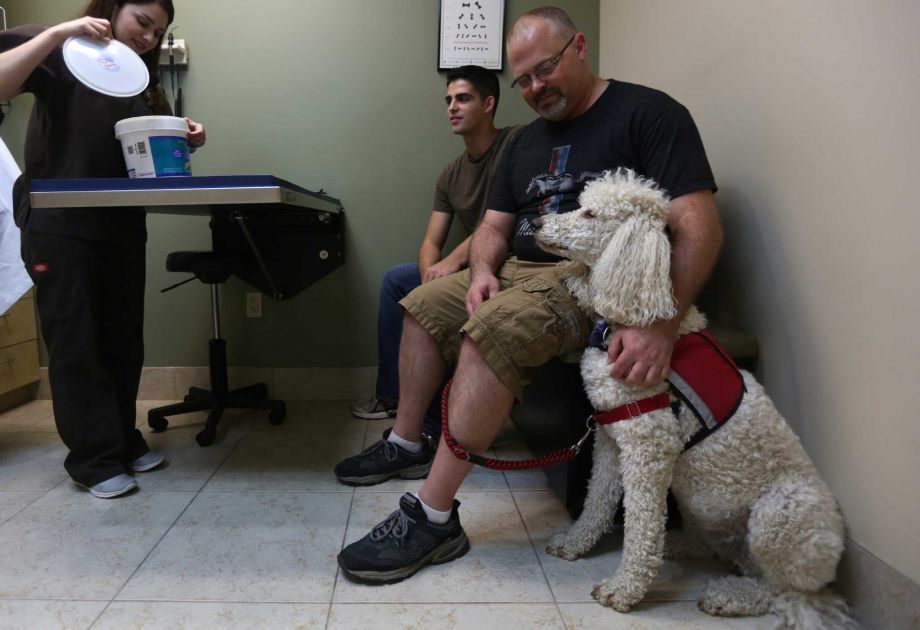Are service dog veterinary bills tax deductible?

A trained service dog helps make a disabled person’s life easier. They can count on the animal to perform duties that the disabled may otherwise be limited to do and as such, service dogs are required to accompany their owners all the time, including at public places and establishments. Without the dogs, the disabled will not be able to function properly.
The cost of keeping a service dog is fortunately recognized by the IRS. The federal agency considers this as medical expense.
“You can include in medical expenses the costs of buying, training, and maintaining a guide dog or other service animal to assist a visually impaired or hearing disabled person, or a person with other physical disabilities,” per the IRS. “In general, this includes any costs, such as food, grooming, and veterinary care, incurred in maintaining the health and vitality of the service animal so that it may perform its duties.”
Some Rules For Medical Expense Deductions
Despite the IRS provision, not all types of service-dog related deductions are applicable. Certain deductions have to be itemized in the IRS form’s Schedule A, from where the agency will evaluate the claims. Additionally, the total medical expenses for deduction must also not exceed 7.5 percent of the individual’s gross income. These very same rules apply for other medical and dental related deductions.
Not All Service Dogs Covered
The IRS may not extend tax deduction provisions on some types of service dogs, particularly if they are not certified to help the disabled alleviate his conditions. Since there is no governing agency that ascertains service dog registrations, the proof of the burden lies on the individual. The disabled has to show that he needs to dog’s help because of his medical limitations and he has spent for the dog’s training so that the animal can help him.
The individual must be able to answer some of the following questions:
- Has a licensed medical professional diagnosed the disability and determine that a service dog is necessary?
- Has the dog been to a training school to be able to perform specific duties for the disabled?
- Has the dog’s training and abilities helped with the medical condition and how?
Ideally, on top of the diagnosis from the health expert, service dogs that receive proper training from an institution can be provided with a certification to support IRS claims. However, if a service dog has been self-trained, the individual must personally ask a tax professional on how this can be covered by the tax deductions.
Disclaimer: While the information here is accurate to the best of our knowledge, laws may vary or change and you should always check with CPA or accountant.
About the Author: The writing team at Service Dog Certifications is made up of folks who really know their stuff when it comes to disability laws and assistance animals. Many of our writers and editors have service dogs themselves and share insights from their own experiences. All of us have a passion for disability rights and animals.
1 comment
Leave a Reply Cancel reply
Latest Posts

Can you bring a service dog to a museum?
Yes, you can bring your service dog to the museum! All the major U.S. museums welcome guests with service animals in accordance with the Americans with Disabilities Act (ADA). There are some areas, however, that might be off-limits. Here’s what you should know if you plan to spend a day at the museum with your […]

Read More

How to Bring a Service Dog to Six Flags Magic Mountain
Service dogs are welcome at Six Flags Magic Mountain so long as they are, according to Six Flags, “trained to do work or perform tasks for people with disabilities.” Of course, your dog must be housebroken and remain on a leash or harness and under your control while at the park — and the park […]

Read More

When Stores Can Refuse Your Service Dog
According to the Americans with Disabilities Act (ADA), service dogs should be allowed into any store most of the time. A store owner can legally exclude a service dog if they are actively growling, snapping at, or frightening customers, or if the dog is obviously out of the control of its owner. Ordinary behaviors — […]

Read More

my doctor told me to get a dog. I have a hearing loss [60%] and a ” low vision problem, can not be fitted with glass for this problem
I got a dog and my son and I trained him for my hearing problem and my safety . he is with me all of the time. I registered him and has
a number and the tags and a green jacket. he wears is jacket when living the property with me. he sleep with me and lets me know if something
is not right an he is friendly if I tell him to be quite. he has had a problem with some thin and we are still working with him. I have had a number of
vet bill and I am on a low income and my son is my care giver. and all is well with gary my son] myself and blu-boy. we live out in the country and he has the run of it. nearest neighbor is over a 1/4 miles away. down the private road. my main concern is the vet bills.